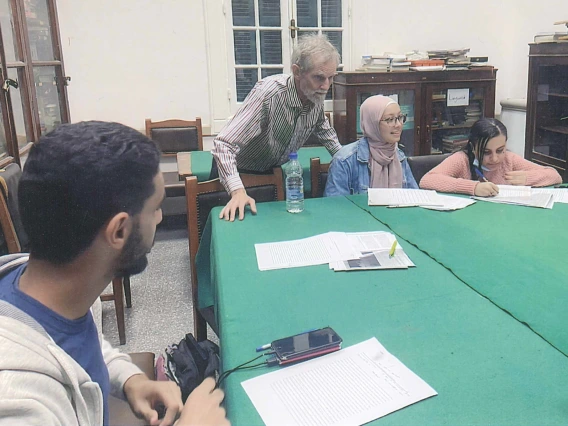
For about 12 years in the middle of the 14th century, an anonymous writer from Germany lived in Cairo, producing a detailed text about the Muslim world.
Last fall semester, on a Fulbright grant to conduct research and teach at Cairo University, University Distinguished Professor Albrecht Classen worked to produce a translation of that author’s work, while also teaching medieval European literature to Egyptian students.
In those cultural exchanges, despite the gap of nearly 700 years, Classen saw time and time again how universal human values and experiences can unify people across any sort of boundaries. The biggest challenge of his grant, Classen said, was convincing the Fulbright committee that a professor in the Department of German Studies should be selected for Cairo.
“The sum of my experiences was that anyone can go to Egypt, or any other country, with the purpose of working with universal values,” he said. “Arabic values, American values, German values, in essence they are all very similar, about universal respect and tolerance.”
Teaching in the classroom, as well as giving lectures and workshops across Cairo, Classen said he was able to forge a connection between 21st century Muslim students and medieval European literature and demonstrate that literature is valuable no matter where it comes from.
“I reflected not just on medieval literature, but on the question of literature in general. I asked students what literature does, what they find in it,” he said. “In essence, you have great opportunities to reflect on fundamental concerns people have all over the world, at different times, in different cultures. There are questions of love, death, the quest for God, happiness, and the meaning of life. That goes to the heart of the matter of the humanities, really.”
For his research, Classen produced a translation of a text by an anonymous Low German author from Cologne who lived for about 12 years in Cairo, sometime around 1350. While the identity of this author is unknown, he described that world around him in the most detailed terms, observations that offer clues about his role in society.
“He doesn’t talk about things a pilgrim would talk about, or matters that would concern a merchant. This author talks about a lot of architecture and agriculture, the fauna and flora. He talks about the multiplicity of cultures and religions, so I think the best explanation for his status would be that he was a diplomat,” Classen said. “Normally in my entire filed of research, diplomats do not emerge as authors. It’s an extremely important and interesting text.”
Classen completed both a manuscript, which is now with a publisher, and an article on his teaching.
In general, the Fulbright experience was eye-opening in terms of seeing how interconnected the world can be, Classen said.
“In our department here, we have a lot of graduate students from various African countries and it’s very interesting to realize that German is an important language in many different African countries, for economic reasons,” he said. “I came back with a very strong sense that indeed, German as an academic subject matter plays a big role in Egypt.”

